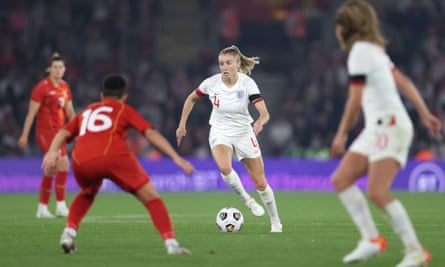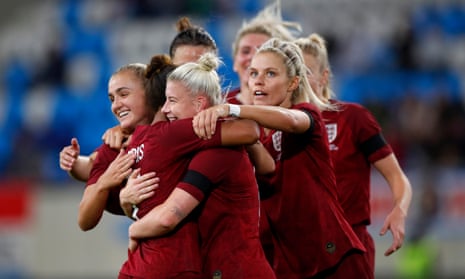It is hard to learn much two games into a manager’s tenure and even less can be taken from bulldozer performances against amateur players for teams ranked outside the world’s top 100. However, England do not choose their 2023 World Cup qualifying opponents, so what have we learned from the 8-0 defeat of North Macedonia and 10-0 win over Luxembourg?
Signs of progress
Against North Macedonia last Friday, England were rampant with 81% possession and 48 shots. However, they had only eight goals to show for that dominance. The straight-talking Sarina Wiegman, who joined from the Netherlands, demanded more. “What we know is we need to finish better than we did,” she said. “We can be a little bit more composed, more connected, those little things. So we can learn from that and bring it to a higher level, so that even against a better opponent, we can score too.” That demand was heeded. Against Luxembourg on Tuesday, England scored 10 from 38 shots and 82% possession. Although small, there was a material difference from one game to the next.
Relentlessness
Wiegman’s demand for more from a team that had scored eight shows a relentlessness to the European Championship-winning manager. She will not settle for a performance that drops off regardless of the opposition. In both games many managers would have shuffled the pack and used squad players with few or no caps, but not Wiegman. She did switch things, but she brought on players of a similar calibre to those withdrawn, tweaking to maintain the tempo. “I think her message is always: ‘If you can go and score 10, score 10; if you can go and score more, score more,’” said the centre-back Millie Bright. “She wants us to remain composed and just be relentless.”

Spread the load
England scoring 18 goals in Wiegman’s first two games is important regardless of the opposition because they have struggled in this area. Ellen White’s prolific efforts, which have taken her to within three of Kelly Smith’s England goalscoring record of 46, have papered over the cracks of a team that have found it difficult, as against North Macedonia, to score as many goals as the chances created have warranted. Against tougher teams, not taking chances can be much more costly. Goals scored by a wider variety of players is important for the group’s confidence. Bright, who scored her first two England goals against Luxembourg, said “the past is the past”. “We’ve implemented so much into the group in just the first camp and hopefully the fans are excited by what they saw. It’s a great base for us to work from and putting the ball in the back of the net – it sounds easier than it is, no matter the opponent you’re playing, whether it’s a pressing team, a low block, there’s still a lot of work that goes into these games. We have to break the block down and be clinical. It’s really nice to see different goalscorers. That shows we’ve got a lot of threat front to back in open play, from set pieces, and it’s a great foundation.”

Captaincy
Steph Houghton has been an incredible ambassador for women’s football in England and for the Lionesses but, at 33, her time at the top is not infinite. Wiegman has said she is yet to choose her long-term captain but gave Houghton the nod for the September games before an ankle injury forced a change of plan. There are a number of options for captain: Mary Earps, Jill Scott, Bright and White have filled the role for club or country and the world player of the year Lucy Bronze, who is injured, is another candidate. That Wiegman plumped for the 24-year-old Leah Williamson, who has 22 caps, shows the manager is thinking long-term and can see what Arsenal fans have believed for years. If Wiegman chooses to stick with Williamson it will mark a key moment in the team’s evolution, a changing of the guard. It will also show Wiegman will put pragmatism before sentimentality.
